
















 |
Step
1: Estimate the home's market value
Step
2: Find out if home prices in your area have been rising or
falling
Step
3: Estimate what you think the home's worth
Step
4: Consider
your bargaining position
Step 5: Decide
on an offer price
Step 6: Decide how to make the offer
Step 7: Make the offer
Step 8: What to do if your offer isn't accepted
What
to do when you want to come up with a fair price for both parties
Advanced
negotiating tactics
You've
found the perfect house, checked it out carefully, and slept on the decision to
buy it. Now it's time to make an offer.
Step
1: Estimate
the home's market value
The asking price is typically set about 1-10% above the seller's
estimate of its market value. But sellers can get that wrong, and
they're sometimes willing to accept offers that are well below the
asking price. To estimate the home's market value, I
recommend that you collect data from various sources:
-
Get
a $29.95 Complete Property Valuation from electronicappraiser.com.
-
Get
free online appraisals of the property from Zillow.com,
realestateabc.com, and Ditech.com. (On the
Ditech website, click on "Calculators," and then click on "Free
eAppraisal.")
These websites don't reveal their appraisal methodology, but I
think it's based on taking the last sales price for the property and scaling it upward or downward according to how
average property prices in the neighborhood have changed.
If the owner has spent a lot of money remodeling the house, you should fudge the estimates up accordingly.
I found that
Zillow gave fairly good estimates for houses in subdivisions but
poor estimates for houses with unique attributes, like
custom-built homes on scenic lots. Zillow allows you to
review the details they have about your home (Click on the
"See home details" link) and edit them.
-
Get
information about "comparables"--houses that are
similar to the one you want to buy that have sold recently. Zillow.com
and realestateabc.com
are good sources. (Click the "Map comparable
homes" link.) So is realestate.yahoo.com
(Click on What's My Home Worth? in the Tools section on the left
hand side.) Create a separate fact sheet for each comparable,
then drive (or better yet, walk) by all of the
homes and compare them to the one you want. Try
to guess how much more or less your dream house is worth compared to each of
them, then use these guesses to fudge
the actual sales prices of the comparables into estimates of
your home's market value.
| Don't rely too
much on online appraisals. Here are the estimates I got
from some online appraisal services for four different
properties in California:
A custom house in the city,
last sold in 1998:
- Zillow.com: $990,120
- RealestateABC.com:
$958,000
- Ditech.com:
$793,000-$975,000
A custom house with scenic view
on the coast, last sold in 2002:
- Zillow.com: $467,007
- RealestateABC.com:
Insufficient data
- Ditech.com: $562,000 -
$727,000
A tract home, last sold in
1983:
- Zillow.com: $492,520
- RealestateABC.com:
$490,000
- Ditech.com: $515,000 -
$595,000
A tract home, last sold in
2005:
- Zillow.com: $405,040
- RealestateABC:
$432,000
- Ditech.com: $405,000 -
$498,000
|
|
Other
sources won't be of much help, either. I
examined three reports by certified appraisers that were based on adjusting the sales
prices of comparables that had sold recently to account for
differences between them and the subject property. The
adjusted sales prices often varied by quite a bit:
|
Property
|
Adjusted
sales prices
of comparables |
Appraised
value
|
|
#1 |
$717,500
$671,500
$720,000 |
$700,000 |
|
#2 |
$138,500
$148,175
$148,955 |
$148,000 |
|
#3 |
$476,180
$507,380
$541,150 |
$475,000* |
|
*This
property had just sold for $475,000 and the purpose of the
appraisal was to reassure the lender that the price was
reasonable. |
|
Step
2: Find out if home prices in your area have been rising or
falling
Go
to the website of the National
Association of Realtors and click on the Existing Home Sales link on
the lower left hand side of the page. Look at the Existing Home
Sales and Pending Home Sales reports and see whether prices in your area have appreciated or depreciated.
Don't put too much stock in this information, though:
-
The
home prices reported by the NAR can rise not just because of
supply and demand, but also because more expensive homes are being
built in the area or because people are making improvements to their
existing homes. Ideally, we'd like to use a price index that
shows how much a typical house in your price range would have
appreciated or depreciated over time if no home improvements were
made.
-
Home
prices might be sticky downward. If a market is falling, you
might not be able to see how weak it is for several months.
That's because home sellers have trouble facing the fact that their
homes have depreciated. What you see instead is that homes
stay on the market for longer periods of time.
-
Many sellers (and builders) have been offering generous incentives
and credits to sell their homes. So while the statistics are showing
just modest drops in sales prices, the amounts sellers are actually
netting have been dropping by quite a bit more.
-
The NAR and other
reporting agencies use median rather than average prices.
These can understate the severity of the downtown if
higher-end homes
sell better than starter homes. Indeed, it's even possible
for the median sales prices to rise in an area where all home prices
are falling.
|
Here’s
an extreme example that shows how it's possible for
median prices to rise even as average prices are falling:
Suppose
that there are just two kinds of properties in the town of Homesville: luxury homes and starter homes. In 2005, 200 luxury
homes were sold for $800,000 each and 300 starter homes were sold
for $400,000 each. In 2007, 150 luxury homes were sold for $600,000
each and 100 starter homes were sold for $300,000 each. Even though
the prices of all homes in Homesville dropped by 25% between 2005
and 2007, the median sales price rose from $400,000 to $600,000.
Moral: Don't rely too much on median price data. |
Use
this information to make adjustments to your market value
estimates. For example, if you based an estimate on sales
data that were six months old and if you believe that prices have
risen by 10% over the past six months, then adjust the market value
estimate upward by 10%.
Step
3: Estimate what you think the home's worth
This
value may be more or less than the home's market value, but bear in mind
that lenders sometimes won't approve loans if the sales price is much
higher than the appraised market value.
A
good way to figure out what the home is worth to you is to weigh your alternatives against
one another. Suppose you're interested in a house on South Street,
but you also like a smaller one on
Cable Road. Write down the benefits of the two choices on a piece
of paper. Here's how your notes might look:
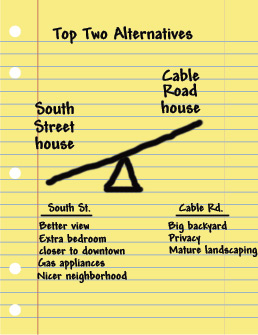
This
diagram shows that, to you, the benefits of the South Street house outweigh those
of the Cable
Road house.
Now
try to imagine how much money you would need to add to the Cable
Road house in order to make the two properties equally appealing to you.
For example, if you added $100,000 to the Cable Road house, would that
make it more appealing to you than the South Street house? Keep
testing different numbers until you come up with a number that exactly
balances the two sides, like this:
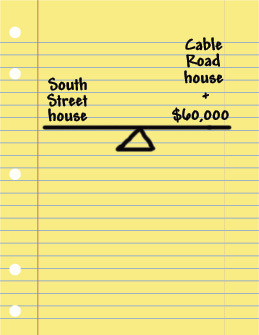
Now
guess the market value of the Cable Road house (say $870,000) and do some algebra. Think of the
balance's fulcrum as an equal sign and solve for the value of the South Street
house. In this case, the equation would read: South Street house = Cable Road
house + $60,000. Substituting in your estimate of the price of the
Cable Road house, you'll get a value for the South Street house of
$870,000 + $60,000 = $930,000.
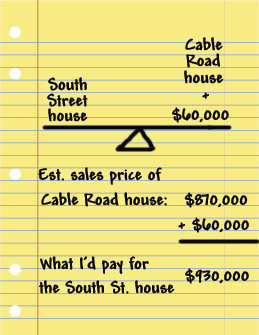
The
sum, $930,000, gives you an estimate of the maximum price you should pay
for the South Street house, based on the assumption that you could buy the Cable Road
house for $870,000.
Now
do the same exercise with one or two other options. Perhaps
one would be to buy the Bond Street house, which you prefer by
$40,000 to the South Street house:
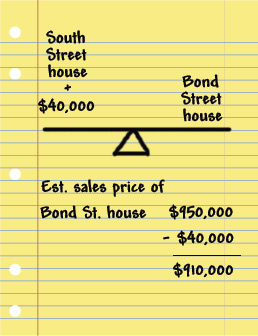
Again,
use algebra to solve for the value of the South Street house.
Here's the equation: South Street house + $40,000 = Bond Street
house. If you
estimate that the Bond Street house would go for $950,00, then the value
to you of the South Street house is $950,000 - $40,000 = $910,000.
This means that the most you should pay for the South Street house is $910,000,
assuming you could buy the Bond Street house for $950,000.
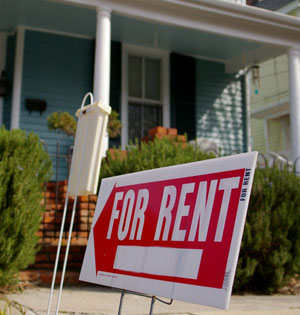 |
When
deciding how much a house is worth to you, consider renting as
an option.
See The Buy vs.
Rent Decision by Suze Orman for help
in thinking this through. |
Step
4: Consider
your bargaining position
My
husband is a good negotiator, but it's agonizing to watch him in action.
He sometimes starts low--really low. The buyer's agent (or car
salesperson) invariably looks crestfallen. I don't say anything during
these negotiations, but I always feel faintly ashamed and embarrassed.
After wasting hours or even days of the salesperson's time, we're finally
revealing ourselves to be flaky and unrealistic.
But
we often end up getting terrific deals.
 |
Buyers'
agents will often act disappointed or annoyed if you want to make a low offer. Pay no attention. |
Of
course, we don't always make low offers. Once, we even made a full-price
offer with no contingencies on a lot that we absolutely had to
have. There were no other lots like it and we were afraid we'd
lose it to another buyer.
Whether
or not you can start low depends on the strength of your bargaining position. Here are some factors that would give
you a strong bargaining position:
-
If
the
house has been on the market for a long time.
-
If
there
are other, similar houses in the neighborhood.
-
If
you're
likely to be able to close the deal in a timely manner.
-
If
you're
interested in more than one house.
-
If
you're in no hurry to buy a house.
If
your bargaining position is weak, it will be harder to get a good deal.
That's why it's a good idea to strengthen your position before you begin
negotiations. One way to do this is to sell your existing home before you begin
searching for a replacement. Another is to go a mortgage lender
and get pre-approved for a loan so you can demonstrate your ability to buy
the house. Finally, you should look at lots of houses and try to find several that are
acceptable to you.
 |
If
you fall in love with a unique home that's fresh
on the market, try to act relaxed and unrushed so the
seller won't grasp the weakness of your position. |
Step 5: Decide
on an offer price
If
your bargaining position is strong, try subtracting 10% from either your
estimate of the market value or the asking price--whichever is lower.
Suppose, for example, the asking price was $950,000 and your estimate of the home's
market value was $920,000. I'd recommend that you consider a
starting offer of $830,000 (which is roughly 90% of $920,000). Before
making this offer, verify that the offer falls below your lowest estimate of what the house is worth to you ($910,000 in our
example). If it doesn't, lower it.
If
your bargaining position is weak, or if the housing market is hot in your
area, you'll probably want to make an offer that's much closer to the asking
price. And if the market is very hot, you may want to make an offer
that's above the asking price.
Step 6: Decide
how to make the offer
Here
are your options for FSBO properties:
|
A
buyer's agent showed you the house. |
The
agent is probably entitled to the commission. Make the
offer through him or her. |
|
You visited an open house that was hosted by a real estate agent. |
The
agent hosting the open house may try to claim some or all of the buyer's agent's
commission. |
|
No
agent showed you the house. |
You don't need to make an offer through a licensed agent.
You can make an offer directly, or (for a flat fee) through a
discount agent or lawyer. If the seller is offering a buyer's agent's
commission, you can arrange to have it waived or to have most of
it rebated back to you. |
To find
a lawyer, go to Lawyers.com and look under REAL ESTATE>Buying or Selling a Home,
or go to Findlaw.com and look for a real estate lawyer who specializes
in transactions. These lawyers will sometimes offer to represent you for
a share of the buyer's agent's commission (say, 1%) or a flat fee, but you can usually do
better if you pay the lawyer by the hour. A typical fee in my area is
$200 an hour.
Since
$200 an hour comes to over $3 a minute, I suggest you arrive at the lawyer's
office well prepared. Begin by getting a standard form Offer to Purchase
Real Estate for your state (you can usually download these from Nupplegal.com),
read it carefully, and fill it out to the best of your ability. The
lawyer's job should be to go over the contract with you and look for
problems.
If
you're working with an agent, don't share your negotiating
strategy. As I've noted, "your" agent may actually be
representing the seller. If you share your strategy, the agent
might have a fiduciary duty to share that information with the
seller.
Step
7: Make the offer
Here's
what to expect when you make an offer:
-
You'll
be asked to give an offer price for the property.
-
You'll
be asked to explain how you plan to pay for the property. (As I
noted earlier, appending a pre-approval letter from a bank costs you
little and sweetens your offer.)
-
You'll
be asked to write a check payable to the seller as an earnest money deposit, usually for
3-5% of the offer price, and even more in a hot market. The lawyer or agent will hold onto the
check during the price negotiations. If your offer is accepted and
you later default on the contract, you'll forfeit the deposit.
-
Your broker or lawyer will probably add some contingencies to the contract so that will
let you walk away from the deal if something goes wrong. For
example, you’ll want to get out of the deal if you can’t get
financing, or if there’s something wrong with the house that wasn’t
disclosed. This
article talks about the importance of these two contingencies.
-
The
contract will specify who pays for various closing
costs. These expenses are often allocated according to local
customs.
-
The
contract will establish a timetable for completing the deal.
-
The
contract will set a date for when you can move in.
-
The
contract will specify who is responsible for any repairs or improvements.
-
The
contract will specify what stays and what goes (e.g., light fixtures,
drapes, appliances)
|
Your offer's cover letter
Begin your offer
with a cover letter that lists all of the documents you're including
and gives the deadline for the response and your contact
information. You should also try to justify your offer price,
perhaps by describing comparables nearby that sold for a low price.
|
Step 8: What to do if your offer isn't accepted
If
your offer is accepted, congratulations! But it usually won't be if
you've started with a low offer. Here's how to interpret different
reactions to an offer of, say, $830,000:
-
The
seller counters with $930,000. Sellers sometimes devise
counteroffers with the hope you'll offer to "split the
difference." In this case, the seller may be hoping you'll bid
$880,000. I recommend countering with
a lower value, say $860,000, and see what happens.
-
The
seller counters with a firm price of $910,000. A firm price means
the seller isn't willing to entertain a counteroffer from you. Since
paying $910,000 for the South Street house would leave me as well off as
I'd be if I paid $950,000 for the Bond Street house, I'd politely reject
the counteroffer and urge the seller to contact me if he or she had a
change of heart. Meanwhile, I'd make an offer on the Bond Street
house to see if I could get it for less than $950,000. If that
failed, I'd try to get the Cable Road house for less than $850,000.
(If I paid $850,000 for the Cable Road house, it would be equally
appealing as paying $910,000 for the South Street house.)
-
The
seller rejects the offer outright. There are several possible
reasons for this. Sometimes it's because the seller is entertaining
or expecting another, higher offer. Sometimes it's because the
seller hopes to press you into coming in with a much higher offer.
Sometimes it's because the seller is inexperienced, and is reacting
emotionally to what he or she perceives as an insulting offer. I
recommend urging the seller to reconsider and make a counteroffer.
Send signals that you like the house and that you're a serious buyer.
Sometimes
the seller is willing to bend on price, but not on something else. Some
friends of mine were involved in negotiations for a $700,000 that broke down
over whether the drapes would stay or go. If something (like drapes or
the move-in date) matters more to the seller than it does to you, it's wise to
bend.
What
to do when you want to come up with a fair price for both parties
If
the seller were willing to accept a minimum of, say, $860,000 for a house and
you the buyer were willing to pay a maximum of $910,000, then any price within that $50,000 gap
would make both of you better off. When negotiating a price, each of you
would normally use skill and cunning to capture as much of that
$50,000 as possible. But what if you and the seller aren't
evenly matched? What do you do if your opponent is elderly, sick,
desperate, poorly educated -- or a friend or relative?
In
these cases, I believe that you should abandon the game of negotiation and
simply try to find a fair price. Here's one way to do it:
-
With the seller, randomly select two appraisers and hire them to come up with
independent estimates.
-
Agree to sell the house at the average price, assuming the price is below the
maximum amount the buyer is willing to pay and above the minimum amount
the seller is willing to accept.
Advanced
negotiating tactics
-
Don't
fall for statements like these: "The price is $20,000 below
market." or "It's selling for less than the appraised
value." If the house can only sell for $600,000 in a market,
than that's the market value. If a house
is priced below the appraised value, then the appraisal must be
off.
-
If
you're working with a real estate agent, don't rely upon him or her for
advice about how much to offer. It's in the agent's interest for you
to make as high an offer as possible so that the offer is more likely to
be accepted and the commission to be paid. Figure out how much to
offer on your own.
-
If
you're working with an agent, try to convince him or her that your
bargaining position is strong. One way is to make a show of being
interested in more than one house.
-
If someone else is also looking at the property, give
the sellers just a day to respond. This can head off an alternative
offer.
-
If
things get bogged down, talk directly to the seller. Agents won't
like this, and some sellers won't want to talk with you. But this
might be an effective way of working out a deal.
-
If you can't break an impasse with a seller, consider making an
appraisal offer, in which you offer to pay the average appraised value
made by two
randomly chosen appraisers.
Next
topic: Closing
ŠLori
Alden, 2008. All rights reserved.
|
 |